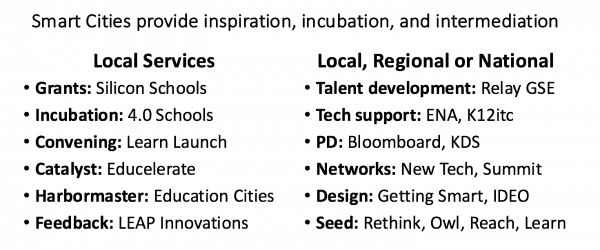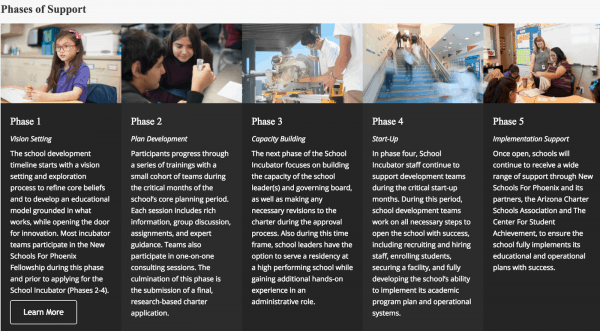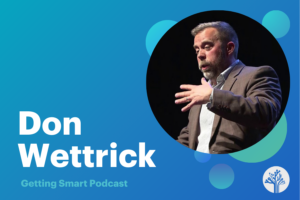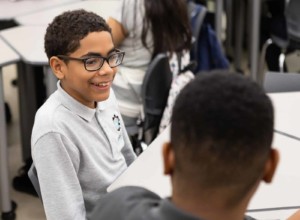New Schools Flourish in Phoenix

Education is by its very nature an intermediated enterprise: students need teachers to interpret and inspire; teachers need coaches and colleagues to grow; schools need guides, tools and resources to improve and innovate.
Cities need talent partnerships, aligned investment and incubation capacity to flourish (the thesis of our 2014 book Smart Cities).
There is a great opportunity to improve and innovate but (unlike straight-forward direct to consumer services) urban education requires a layer of services that provide inspiration, incubation and intermediation.
Local innovation intermediaries play six key functions: grants, incubation, convening, catalyst, performance feedback and harbormaster (a steward for equity that often plays other roles). There are six other services which may be local, regional or national: talent development, tech support, professional development, design, school developers and seed funding (summary with examples below).

Smart Cities
We’ve been visiting cities all over the country observing this intermediation layer.
- Denver, (the district with a great elected board) is playing a key role in intermediation, incubation of new schools and authorization of charter networks.
- The sprawling Bay Area benefits from highly capable local partners like Rogers Family Foundation which is making a difference in Oakland, Silicon Schools advancing blended models and lots of EdTech investors. (See Smart Cities Oakland, San Francisco, Silicon Valley.)
- Houston has a strong urban school district with global goals, great charter schools and the best example of regional talent development makes Houston interesting. Microschool movers include A+UP and Talent Unbound.
- New Orleans is a collection of charter schools supported by New Schools for New Orleans in the process of adding back some coordinated services and decision making.
- DC Public Schools has talented staff and has leveraged CityBridge Fellows and several rounds of NGLC grants. Almost half the students attend charters like Chavez Schools where learners leverage the local policy environment and benefit from guidance support from Charter Board Partners (where I’m a director).
It’s clear that any city making progress in education is doing so with an active intermediation layer. Another city on the move that may be off your radar is Phoenix.
Phoenix on the Rise
After teaching for four years in Phoenix, Andrew Collins joined the Arizona Charter Schools Association. With 556 public charter schools serving over 170,000 students, the association plays a pivotal role in Arizona.
With support from the Walton Family Foundation, the Association launched New Schools For Phoenix. Collins, one of thousands of Teach for America alumni to be leading a school or an education organization, launched a school incubator, a fellowship program and a school turnaround effort.
“We want to think about innovation and the pursuit of excellence unbounded to impact thousands of students in this city,” said Collins, who has been leading school visits to a variety of next generation models locally and across the West in Denver, Austin, Houston, L.A. and the Bay Area.
Serving as a launching point, the New Schools For Phoenix Fellowship is a five-month leadership development experience that builds the awareness, knowledge and ability to lead highly-effective schools. Fellows meet evenings and weekends and visit great schools nationally as they develop a school vision and begin the design process. Of the 61 Fellowship alumni, most have gone on to lead or support schools in the Phoenix urban core and many have advanced to the school incubator to open an innovative new school.
The New Schools for Phoenix school incubator provides cohort experience for about five leaders each year planning highly-effective schools in a low-income communities. The development process is divided into four phases from vision setting, plan develop, capacity building, to startup (below).

Four cohorts have graduated from the incubator resulting in great new schools like Western School of Science and Technology. Founded by 2012 Fellow Peter Boyle, the school opened in 2014 and serves 400 students in grades 7 through 10.
The New Schools For Phoenix Fellowship is a five-month leadership development experience that builds the awareness, knowledge and ability to lead highly-effective schools. Fellows meet evenings and weekends and visit great schools nationally. Most candidates work in the Phoenix urban core and want to transform their school or open an innovative new school.
The most recently launched program, Pathway to Excellence, aims at turning high potential schools into high quality schools. Partner schools spend a year redefining their school vision and developing a strategic improvement plan. The program is open to both charter and districts school alike.
For both the School Incubator and Pathway to Excellence, leaders start together in the Fellowship experience putting innovative, entrepreneurial school founders and veterans principals in the same room to dialogue about what drives excellence in schools and apply a design approach to establishing the systems needed to drive high levels student growth.
New Schools For Phoenix receives support from local foundations including Helios and Parsons. They also support A For Arizona, led by Lisa Graham Keegan, which advocates for state policies that promote and reward A-grade education statewide.
What’s next? Phoenix would benefit from a dedicated new and transformed school grant fund like the seven NGLC Regional Funds for Breakthrough Schools or Silicon Schools in the Bay Area.
For more see:
- Smart Cities: Phoenix
- Paradise Valley Schools Use Fiber and Video to Boost Teacher Collaboration
- Recap of leading Phoenix networks: Great Hearts and Basis
Stay in-the-know with all things EdTech and innovations in learning by signing up to receive the weekly Smart Update.







0 Comments
Leave a Comment
Your email address will not be published. All fields are required.